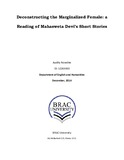Deconstructing the marginalized female: a reading of Mahasweta Devi’s short stories

View/
Date
2014-12Publisher
BRAC UniversityAuthor
Nowshin, AudityMetadata
Show full item recordAbstract
Women’s positions in society, particularly those of marginalized/ peripheral ones positions are very preoccupied with the sense of docility and negligence. Marginalized1
1 The word ‘Marginalized’ used as the substitute of poor/ tribal/ peripheral. women, the tribe or the poor women and the outcast or the rebellious women, do not have any ‘decent’ or ‘proper’ position and identity in society. Their sufferings have long been avoided, and were not even considered as ‘wrong’ but the usual consequences of everyday life. Every woman does not belong to the upper class or face the fate of misery or not, every single woman has the same tragedy to endure but many of them have similarities. They have similar stories indifferent pronunciation and different situations. Mahasweta Devi’s stories speak of this unspeakable truth of women’s misery and their power of enduring and resistance. In her stories, readers get the linear story which is derelict in mainstream literature. Her fiction offers an array of female’s figurative situation/ position in society as well as their materialistic use of the body for the social and economic purpose. In my thesis, I am going to discuss some of her short stories such as, “Breast-Giver”, “Draupadi”, “Dhouli”, “Shanichari”, “Chinta”, “Giribala”, “Ma from Dusk to Dawn” and “Sindhubala” in order to explain the paradoxical position and representation of women in society as well as their fragmented voices. I will also look at their endurance and resistance.
Keywords
English and humanitiesDescription
This thesis is submitted in a partial fulfillment of the requirements for the degree of Master of Arts in English, 2014.Department
Department of English and Humanities, BRAC UniversityType
ThesisCollections
- Thesis, B.A. (English) [624]
